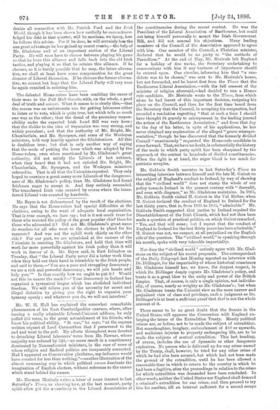Mr. Herman Merivale writes a letter of some interest to
last Saturday's Times, as showing how, at the last moment, party spirit often got the ascendency in the Liberal Associations of the constituencies during the recent contest. He was the President of the Liberal Association of Eastbourne, but could not bring himself personally to accept the Irish Government Bill, and did not conceal his objections. Many leading members oi the Council of the Association appeared to agree • with him. One member of the Council, a Christian minister, declared that he would be no party to "the methods of Parnellism." At the end of May, Mr. Merivale left England for a holiday of five weeks, the Secretary undertaking to communicate with him if any business of importance should be entered upon. One circular, informing him that "a can- didate was to be chosen," was sent to Mr. Merivale's house, but not forwarded, and he learnt first from the Times that the Eastbourne Liberal Association,—with the full consent of the• minister of religion aforesaid,—had decided to run a Home- rule candidate. Mr. Merivale wrote to the Times, from which alone he had learnt of this important decision, resigning his- place on the Council, and then for the first time heard from the Secretary that the Council, in accepting his resignation, had recorded a resolution regretting " that at such a time I should have thought fit gravely to misrepresent in the leading journal the action of the Eastbourne Association ;" and from that day to the day of his letter, in spite of his applications, he has never obtained any explanation of the alleged " grave misrepre- sentation," though he has discovered that the formerly divided Council "unanimously " requested the Home-rule candidate to- come forward. That,we have no doubt, is substantially the history of the mode in which party spirit has been sharpened by the approach of the contest in hundreds of divided constituencies. When the fight is at hand, the eager blood is too much for patriotic scruples.


































 Previous page
Previous page